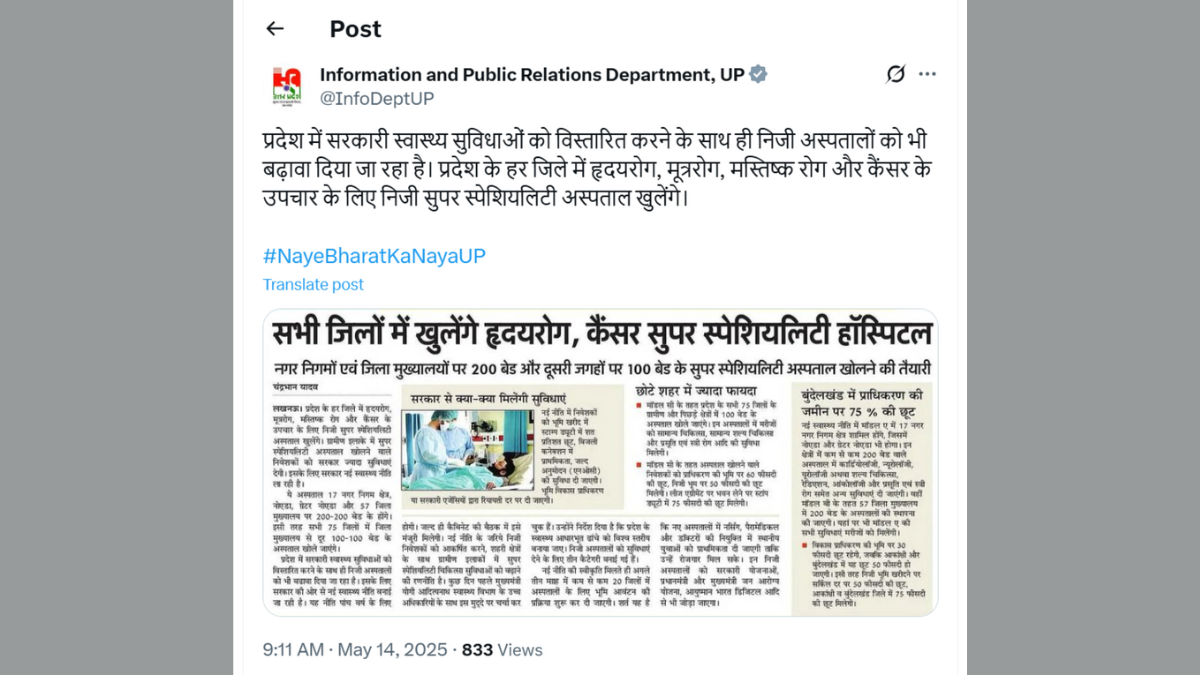
In a significant move to strengthen healthcare infrastructure across Uttar Pradesh, the state government has unveiled a new health policy aimed at establishing private super-speciality hospitals in all districts. These facilities will focus on the treatment of major diseases such as heart, kidney, neurological disorders, and cancer, significantly improving access to quality care for millions of residents.
Table of Content:-
New Health Policy to Boost Private Investment
To bridge the gap between healthcare demand and available services, especially in underserved regions, the Yogi Adityanath-led government is introducing a five-year health policy. The policy is designed to attract private investment by offering substantial incentives for setting up super-speciality hospitals, particularly in rural and backward regions. Chief Minister Yogi Adityanath has directed senior health officials to ensure that the new infrastructure is built to global standards. The policy will soon be placed before the Cabinet for final approval.

Tiered Model for Healthcare Expansion
The government’s ambitious plan categorises healthcare development under three models:
- Model A: This includes 17 municipal corporation areas, including Noida and Greater Noida. In these urban zones, hospitals with a minimum capacity of 200 beds will be developed. These centres will offer a wide range of specialities, including cardiology, neurology, urology, surgical oncology, radiation therapy, obstetrics, and gynaecology.
Also Read: Government Declares September 23 As National Ayurveda Day To Celebrate India’s Traditional Medicine
- Model B: Covering 57 district headquarters, Model B hospitals will also have 200 beds and offer the same level of medical facilities as those in Model A. The initiative ensures that even mid-sized towns have access to advanced healthcare.
- Model C: In all 75 districts of the state, especially in rural and remote areas, hospitals with 100 beds will be established. These facilities will cater to general medicine, basic surgery, maternal care, and other essential services.

Special Incentives for Rural Hospitals
To ensure equitable distribution of healthcare resources, the government will provide enhanced support to investors setting up hospitals in rural areas. These include:
- Land Purchase Benefits: Full exemption from stamp duty on land registration.
- Affordable Land Rates: Government or development authority-owned lands will be provided at discounted rates.
Also Read: Equine Virus Outbreak Hits Kedarnath: Over 1,000 Animals Quarantined As Emergency Vet Teams Deployed
- Faster Clearances: Priority will be given in issuing No Objection Certificates (NOCs) and electricity connections.
Investors in aspirational districts and the Bundelkhand region will receive even higher concessions — up to 50% on land procured from development authorities and up to 75% on private land purchases. For rural model hospitals, the policy offers up to 60% off on authority land, 50% off on private land, and 75% relief on stamp duty when taking property on lease.

Employment Opportunities for Local Youth
In a move to ensure local participation and employment, the policy mandates that hospitals give preference to local candidates in the recruitment of nursing staff, paramedics, and doctors. This step not only strengthens the healthcare ecosystem but also helps reduce unemployment in the region.
Integration with Government Health Schemes
All hospitals established under the new policy will be linked to government initiatives like the Ayushman Bharat Digital Mission, Pradhan Mantri Jan Arogya Yojana, and the Mukhyamantri Jan Arogya Yojana. This integration will make high-quality healthcare more affordable and accessible for economically weaker sections of society.
Bottomline
With plans already underway to allocate land for at least 20 hospitals in the next three months, the UP government’s initiative reflects a robust commitment to revamping the state’s healthcare landscape. By promoting public-private partnerships and incentivizing rural development, the state is taking firm steps toward providing equitable and quality medical services for all.
Also watch this video
How we keep this article up to date:
We work with experts and keep a close eye on the latest in health and wellness. Whenever there is a new research or helpful information, we update our articles with accurate and useful advice.
Current Version
